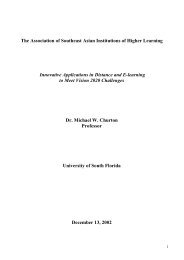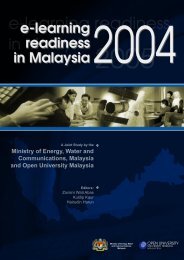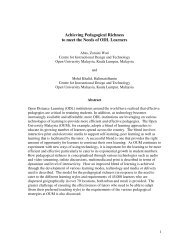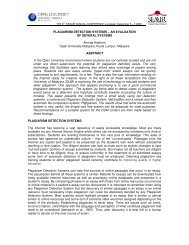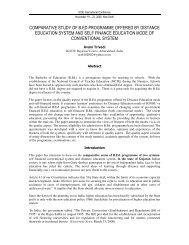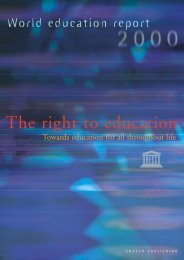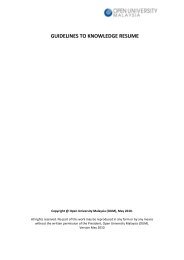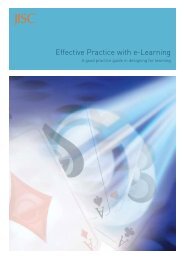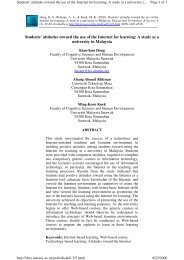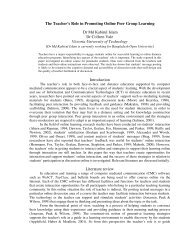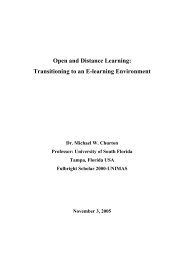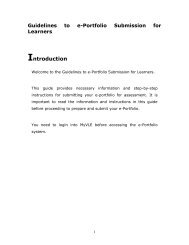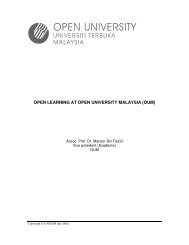lifelong learning and distance higher education - Asia Pacific Region
lifelong learning and distance higher education - Asia Pacific Region
lifelong learning and distance higher education - Asia Pacific Region
- No tags were found...
Create successful ePaper yourself
Turn your PDF publications into a flip-book with our unique Google optimized e-Paper software.
through ICTs (e.g. by phone, fax <strong>and</strong>/or Internet) <strong>and</strong>/or by fixing specific tutoringtimes <strong>and</strong> places. The managing of these processes is an important element inensuring the quality of the <strong>learning</strong> experience provided. This project aims to providesupport for meeting these challenges <strong>and</strong> others related to the provision of quality<strong>distance</strong> <strong>higher</strong> <strong>education</strong>.BACKGROUND TO THE HEODLKB PROJECTThe Higher Education Open <strong>and</strong> Distance Learning Knowledge Base was established toprovide decision-makers <strong>and</strong> practitioners with ready access to information <strong>and</strong> tools thatwill assist them in more effective policy, planning <strong>and</strong> management of ODL in <strong>higher</strong><strong>education</strong> programmes.The project was established as part of UNESCO’s Cross-Cutting Theme (CCT) initiativelaunched by the Director General of UNESCO in 2001. The CCT initiative aimed atfostering intersectoral action pertaining to two cross-cutting themes of UNESCO’sMedium Term Strategy for 2001-2006: (1) the eradication of poverty, especially extremepoverty; (2) the contribution of ICTs to the development of <strong>education</strong>, science <strong>and</strong> culture<strong>and</strong> the construction of a knowledge society. In this framework, the Director-Generalintroduced an innovative strategy of earmarking a certain amount of regular programmeresources for CCT projects. These projects were selected on the basis of a competitivebidding process at the Secretariat level, involving Headquarters <strong>and</strong> Field Offices. Theseprojects aimed to make closer linkages between strategic objectives <strong>and</strong> to test innovativeapproaches <strong>and</strong> delivery modalities in various areas. The projects were chosen throughan evaluation carried out by UNESCO’s College of Assistant Director-Generals in 2001.After an initial funding period of one UNESCO biennium (2002-2003), funding tocontinue this project has been requested <strong>and</strong> awarded twice (in 2003 <strong>and</strong> 2005) throughthe same competitive process for the 2004-2005 <strong>and</strong> 2006-2007 biennium.This project is linked to the cross-cutting theme 6 “the contribution of ICTs to thedevelopment of <strong>education</strong> <strong>and</strong> the construction of a knowledge society”. It is part ofthe main strategic thrust of UNESCO to promote empowerment <strong>and</strong> participation in theemerging knowledge society through equitable access, capacity building <strong>and</strong> sharing ofknowledge. The main strategic objective addressed by this project is that of “promotingexperimentation, innovation <strong>and</strong> the diffusion <strong>and</strong> sharing of information <strong>and</strong> bestpractices as well as policy dialogue in <strong>education</strong>” (UNESCO Medium Term Strategy2001-2007 7 ).The team for this project was established during the first bidding process cycle (2001)mentioned above. The lead unit for the project, the Division of Higher Education,working closely with the Communications Sector, contacted <strong>and</strong> initiated theestablishment of the project team. The project team members were solicited for theirexpertise in <strong>higher</strong> <strong>education</strong> <strong>and</strong>/or ICTs. As a result of these consultations, a multidisciplinaryteam, covering three UNESCO regions <strong>and</strong> with expertise in <strong>higher</strong><strong>education</strong> <strong>and</strong> ICTs, was established. In order to anchor the project solidly in the regions<strong>and</strong> to act as a catalyst for international co-operation, Field partners were encouraged toinvolve regional institutions with ODL expertise in the implementation of the project.As a result of this strategy, the South Africa Institute for Distance Education (SAIDE)in Braamfontein, South Africa <strong>and</strong> the Malaysian Open University in Kuala Lumpur,Malaysia, became implementing partners in the Africa <strong>Region</strong> <strong>and</strong> the <strong>Asia</strong> <strong>and</strong> the<strong>Pacific</strong> <strong>Region</strong> respectively. The Communications <strong>and</strong> Information Sector of UNESCOassured the technical development of the knowledge base. The International Institute for99



